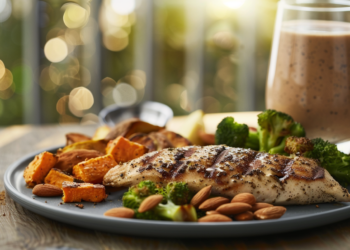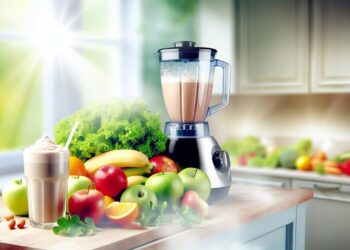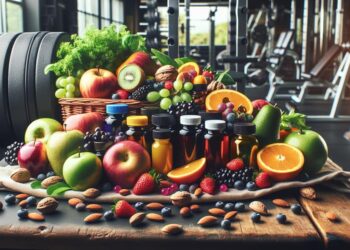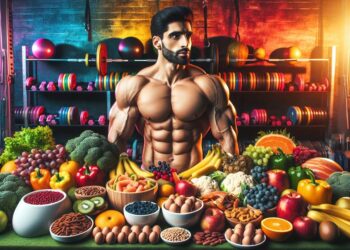Did you know that embracing a vegetarian or vegan lifestyle can provide you with numerous health benefits? From reducing the risk of chronic diseases to promoting a more sustainable environment, plant-based nutrition has gained popularity in recent years. But where do you start? In this discussion, we will explore essential tips and strategies to help you navigate the world of plant-based eating, including how to obtain key nutrients, discover protein sources, incorporate whole grains, boost iron and calcium intake, and even provide you with some delicious meal planning and recipe ideas. So, are you ready to embark on a journey towards a healthier and more compassionate way of eating?
Key Takeaways
- Vitamin B12 supplementation may be necessary for vegans and some vegetarians.
- Plant-based protein sources offer higher amounts of fiber, vitamins, and minerals compared to animal-based sources.
- Incorporating whole grains into meals provides sustained energy, aids digestion, and helps maintain a healthy weight.
- Pairing iron-rich foods with vitamin C sources enhances iron absorption on a plant-based diet.
Essential Nutrients for a Plant-Based Diet
To ensure you are getting all the essential nutrients your body needs on a plant-based diet, it is important to be mindful of your food choices and ensure a balanced intake of key vitamins, minerals, and macronutrients. While a well-planned plant-based diet can provide most of the necessary nutrients, there are a few nutrients that may require special attention.
One important nutrient to consider is vitamin B12. This vitamin is primarily found in animal products, so it is essential for vegans and some vegetarians to supplement their diets with vitamin B12 to avoid deficiency. You can find vitamin B12 supplements in various forms such as pills, sprays, or fortified foods. Consult with a healthcare professional to determine the best option for you.
Another essential nutrient is omega-3 fatty acids. While fish is a common source of omega-3s, plant-based sources such as flaxseeds, chia seeds, walnuts, and hemp seeds can provide these beneficial fats. However, the omega-3s found in plant sources are in the form of ALA and may not be as readily converted by the body into the active forms, EPA and DHA. Therefore, it might be beneficial to include an algae-based omega-3 supplement in your diet.
Protein Sources for Vegetarian and Vegan Diets
When it comes to meeting your protein needs on a vegetarian or vegan diet, there are plenty of plant-based options that can provide you with the essential amino acids your body requires. Contrary to popular belief, you don't need to rely solely on animal products for protein intake. In fact, there are numerous alternative protein options available that offer a wide range of benefits.
One of the benefits of plant-based protein is that it tends to be lower in saturated fat and cholesterol compared to animal-based protein sources. This can help reduce the risk of heart disease and other chronic illnesses. Additionally, plant-based protein sources often contain higher amounts of fiber, vitamins, and minerals, which are essential for overall health.
Some excellent sources of plant-based protein include legumes (such as lentils, chickpeas, and black beans), tofu and tempeh, quinoa, nuts and seeds, and whole grains. These protein-rich foods can be easily incorporated into your meals and snacks to ensure you're meeting your protein requirements.
It's important to note that while plant-based protein sources can provide all the essential amino acids, some may be lower in specific amino acids compared to animal-based sources. To ensure a complete amino acid profile, it's beneficial to consume a variety of plant-based protein sources throughout the day.
Incorporating Whole Grains Into Your Meals
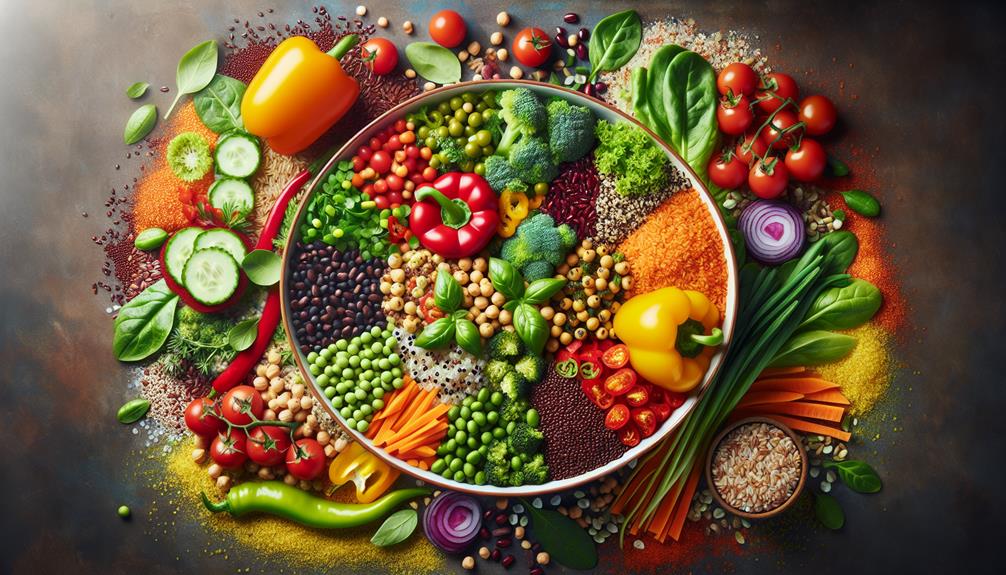
Incorporate whole grains into your meals for a nutrient-rich and satisfying addition to your plant-based diet. Whole grains are an important source of carbohydrates, fiber, and essential nutrients. They provide sustained energy, aid in digestion, and help maintain a healthy weight. Including whole grains in your meals can be easy and delicious. Start your day with a bowl of oatmeal topped with fresh fruits and nuts. For lunch, try a quinoa salad with roasted vegetables and a lemon-tahini dressing. Or, enjoy a hearty dinner of brown rice stir-fry with tofu and mixed vegetables. Whole grain recipes are versatile and can be adapted to suit your taste preferences and dietary needs. Additionally, whole grains offer numerous health benefits. They are rich in vitamins, minerals, and antioxidants, which can protect against chronic diseases like heart disease and certain types of cancer. They also promote gut health, lower cholesterol levels, and support a healthy immune system. So, make whole grains a staple in your kitchen and enjoy the many benefits they have to offer.
Boosting Iron and Calcium Intake on a Plant-Based Diet
Boosting your iron and calcium intake on a plant-based diet can be essential for maintaining optimal health and ensuring you meet your nutritional needs. While it may seem challenging to obtain enough of these nutrients without consuming animal products, there are plenty of plant-based options that are rich in iron and calcium.
To increase your iron intake, incorporate foods such as spinach, lentils, tofu, and quinoa into your meals. These foods are packed with iron and can help prevent iron deficiency, which can lead to fatigue and weakness. Pairing iron-rich foods with vitamin C sources, like citrus fruits or bell peppers, can enhance iron absorption.
When it comes to calcium, plant-based options include leafy greens like kale and collard greens, as well as fortified plant-based milk, tofu, and almonds. Consuming these foods regularly can help maintain strong bones and teeth. However, it's important to note that some plant-based calcium sources may not be as readily absorbed by the body as calcium from animal products. To ensure you're getting enough calcium, consider taking a plant-based calcium supplement.
Plant-Based Meal Planning and Recipe Ideas
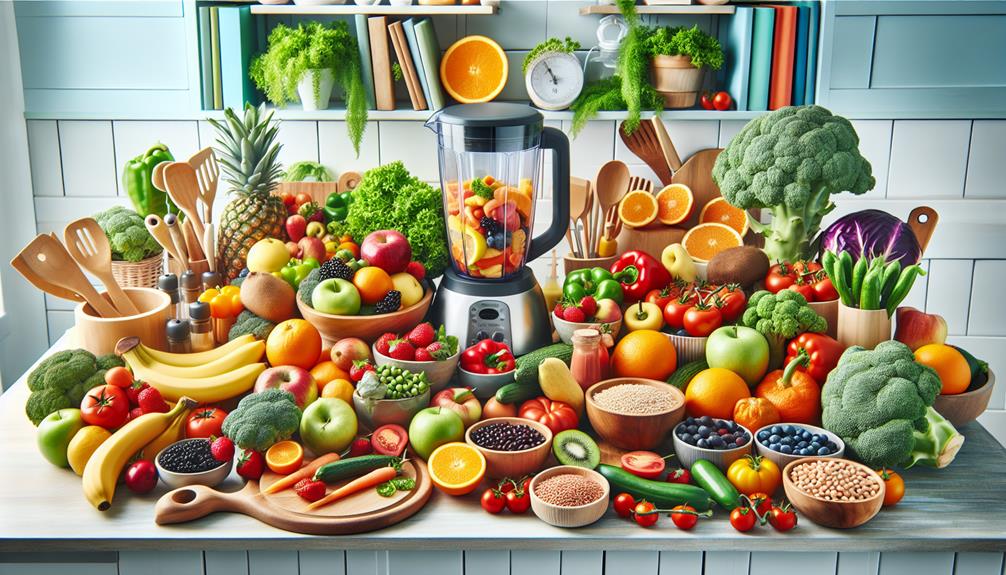
Looking for delicious and nutritious plant-based meal ideas? Meal planning is an essential part of maintaining a healthy vegetarian or vegan lifestyle. By carefully selecting a variety of plant-based protein sources, you can ensure that your meals are well-balanced and packed with nutrients. Here are some meal prep tips and recipe ideas to help you get started:
| Meal | Protein Source | Recipe Idea |
|---|---|---|
| Breakfast | Chia Seeds | Chia Pudding with Berries |
| Lunch | Lentils | Lentil Salad with Roasted Vegetables |
| Dinner | Tofu | Stir-Fried Tofu and Vegetables |
Chia seeds are an excellent plant-based protein source that can be used in a variety of ways. Try making chia pudding by soaking chia seeds in almond milk overnight and topping it with fresh berries for a quick and filling breakfast option.
Lentils are a versatile legume that can be used in soups, stews, or salads. Make a lentil salad by combining cooked lentils with roasted vegetables like bell peppers, zucchini, and cherry tomatoes. Drizzle with a simple vinaigrette for added flavor.
Tofu is a popular plant-based protein source that can be used in many dishes. Stir-fry tofu with a mix of colorful vegetables like broccoli, carrots, and snow peas. Season with soy sauce and garlic for a delicious and satisfying dinner.
With these meal prep ideas and recipes, you can enjoy a variety of plant-based protein sources and create nutritious and flavorful meals.
Frequently Asked Questions
What Are Some Common Challenges That People Face When Transitioning to a Plant-Based Diet?
Transitioning to a plant-based diet can present challenges, but with determination and support, you can overcome them. Common obstacles include finding suitable substitutes, dealing with social situations, and ensuring balanced nutrition.
Can a Plant-Based Diet Provide All the Necessary Nutrients for Optimal Health?
A plant-based diet can provide all the necessary nutrients for optimal health. It's like fueling your body with a garden full of vitamins, minerals, and antioxidants. The benefits for your overall well-being are abundant.
How Can I Ensure I Am Getting Enough Vitamin B12 on a Plant-Based Diet?
To ensure you're getting enough vitamin B12 on a plant-based diet, incorporate plant-based sources like fortified foods and supplements. These options can help meet your nutritional needs and support optimal health.
What Are Some Alternatives to Dairy Products for Those Following a Vegan Diet?
Looking for dairy alternatives on a vegan diet? There are plenty of options to choose from! Almond milk, soy milk, oat milk, and coconut milk are just a few delicious and nutritious choices.
Are There Any Specific Foods or Nutrients That I Should Be Mindful of to Support My Immune System on a Plant-Based Diet?
To support your immune system on a plant-based diet, be mindful of incorporating nutrient-rich foods like fruits, vegetables, whole grains, legumes, and nuts. These provide essential vitamins, minerals, antioxidants, and phytochemicals for a strong immune system.
Conclusion
In conclusion, embracing a vegetarian or vegan lifestyle can provide numerous health benefits, as long as you ensure you are getting all the essential nutrients. By incorporating plant-based protein sources, whole grains, and boosting iron and calcium intake, you can thrive on a plant-based diet. For example, Sarah, a vegan athlete, has seen improvements in her performance and recovery by carefully planning her plant-based meals and incorporating nutrient-dense foods like quinoa, lentils, and leafy greens. With the right knowledge and planning, a plant-based diet can be both nutritious and delicious.






